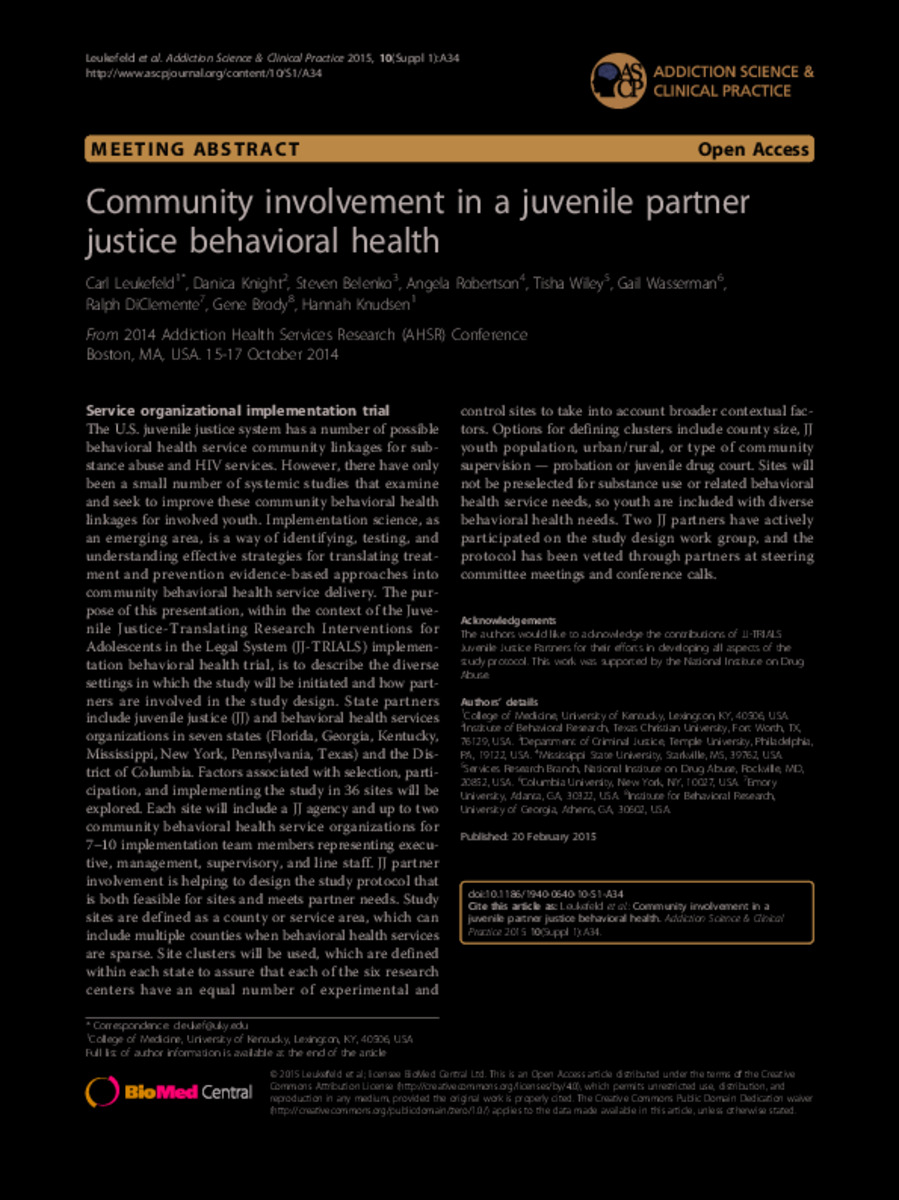Community involvement in a juvenile partner justice behavioral healthShow full item record
| Title | Community involvement in a juvenile partner justice behavioral health |
|---|---|
| Author | Leukefeld, Carl G.; Knight, Danica K.; Belenko, Steven; Robertson, Angela A.; Wiley, Tisha R. A.; Wasserman, Gail A.; DiClemente, Ralph J.; Brody, Gene H.; Knudsen, Hannah K. |
| Date | 2015 |
| Abstract | Service organizational implementation trial The U.S. juvenile justice system has a number of possible behavioral health service community linkages for substance abuse and HIV services. However, there have only been a small number of systemic studies that examine and seek to improve these community behavioral health linkages for involved youth. Implementation science, as an emerging area, is a way of identifying, testing, and understanding effective strategies for translating treatment and prevention evidence-based approaches into community behavioral health service delivery. The purpose of this presentation, within the context of the Juvenile Justice-Translating Research Interventions for Adolescents in the Legal System (JJ-TRIALS) implementation behavioral health trial, is to describe the diverse settings in which the study will be initiated and how partners are involved in the study design. State partners include juvenile justice (JJ) and behavioral health services organizations in seven states (Florida, Georgia, Kentucky, Mississippi, New York, Pennsylvania, Texas) and the District of Columbia. Factors associated with selection, participation, and implementing the study in 36 sites will be explored. Each site will include a JJ agency and up to two community behavioral health service organizations for 7–10 implementation team members representing executive, management, supervisory, and line staff. JJ partner involvement is helping to design the study protocol that is both feasible for sites and meets partner needs. Study sites are defined as a county or service area, which can include multiple counties when behavioral health services are sparse. Site clusters will be used, which are defined within each state to assure that each of the six research centers have an equal number of experimental and control sites to take into account broader contextual factors. Options for defining clusters include county size, JJ youth population, urban/rural, or type of community supervision — probation or juvenile drug court. Sites will not be preselected for substance use or related behavioral health service needs, so youth are included with diverse behavioral health needs. Two JJ partners have actively participated on the study design work group, and the protocol has been vetted through partners at steering committee meetings and conference calls. |
| Link | https://doi.org/10.1186/1940-0640-10-s1-a34
https://repository.tcu.edu/handle/116099117/56571 |
| Department | Institute of Behavioral Research |
| Subject | Public health
Health psychology Social work Psychological intervention Justice (ethics) Drug court Service (business) Population Bioinformatics Medicine Applied psychology |
Files in this item
This item appears in the following Collection(s)
- Research Publications [837]
Related items
Showing a few items related by title, author, creator and subject.
-
A new behavioral health services cascade framework for measuring unmet addiction health services needs and adolescent offenders: conceptual and measurement challenges
Belenko, Steven; Wiley, Tisha R. A.; Knight, Danica K.; Dennis, Michael L.; Wasserman, Gail A.; Taxman, Faye S. (2015)Juvenile Justice-Translational Research on Interventions for Adolescents in the Legal System (JJ-TRIALS) is a cooperative implementation science initiative launched by NIDA in July 2013. The project seeks to reduce unmet ... -
Staying safe in the community: adaptation of WaySafe to help probationers make better decisions about their health risks
Lehman, Wayne E.; Pankow, Jennifer; Knight, Kevin; Rowan, Grace A.; Gray, Julie (2015)Transition from incarceration to the community is a critical time for offenders, especially those with substance abuse problems. Many succumb to temptation to return to drug use and possibly risky needle sharing, and ... -
WaySafe : improving decisionmaking around health risk behaviors for prisoners transitioning back to the community
Rowan, Grace A.; Lehman, Wayne E.; Joe, George W.; Knight, Kevin; Yang, Yang (2015)Many individuals enter the U.S. prison system with a history of high-risk drug and sexual practices, which are two primary contributors to the high rates of HIV and hepatitis cases among this population. As these individuals ...
© TCU Library 2015 | Contact Special Collections |
HTML Sitemap






